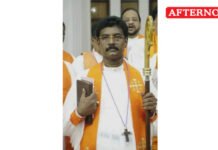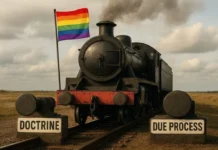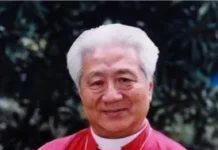ARCHDEACON Dan Gifford has been chosen as Coadjutor Bishop-elect for the Anglican Network in Canada and will succeed Bp Charlie Masters as Diocesan in a year’s time.
Gifford won on the third ballot during an online Electoral Synod held on Nov. 18.
Gifford, who will be 59 in December, is currently the vicar of St John’s Vancouver, serving with David Short who is rector of that parish.
In ANiC episcopal elections, bishops vote alongside priests and deacons so there are only two voting orders: clergy and laity. A successful candidate must obtain a two-thirds majority or 67 percent in both these orders.
There was only one other candidate: Canon Mike Stewart, 56, rector of Saint Matthew’s Anglican Church in Abbotsford, B.C.
Just before the third ballot, Stewart announced that he would be voting for Gifford. On the third ballot Gifford won by 79 percent in the order of laity and by 84 percent in the order of clergy.
In early January the College of Bishops of the Anglican Church in North America will need to confirm Gifford’s election, since ANiC is a founding member of ACNA.
After that confirmation, the Primate of ACNA, Archbishop Foley Beach will consecrate Gifford on Feb. 6 at the Church of the Good Shepherd in Vancouver.
In his acceptance speech, Gifford said he was struck by the theme of this the 14th annual ANiC Synod, the benediction of Hebrews 13:20-21.
“We have a great Shepherd, a chief Shepherd who equips us for everything good to do his will…My confidence has to be in Him.”
He continued, “What a great treasure we have in this Diocese” and he praised Canon Stewart saying, “We shared the long burden” of running for episcopal office. He concluded saying to all the delegates, “We are in this together, in the adventure that lies ahead.”
The normal age of retirement for an ANiC bishop is 70 years of age; however, this may be extended by Diocesan Council to a maximum of two years more. Bp Charlie Masters will serve as Diocesan until the next Synod, November 2022, when Gifford will take over as Diocesan.
In his first year as Coadjutor, Gifford will assume the duties of Area Bishop for western Canada, since Bp Trevor Walters retires this November. Then at the November 2022 synod, a new Suffragan Bishop will be elected.
In his introduction to Synod delegates Gifford wrote: “I have followed Jesus as my Lord and my Saviour for as long as I can remember. I grew up in a Christian home in a suburb of Minneapolis, Minnesota with daily family prayer and Bible reading together.”
When he was 15, Gifford renewed his commitment to Christ and went on to study theology at St John’s College in Nottingham, England.
He obtained his Masters of Divinity from Wycliffe College, Toronto in 1990 and was ordained to the priesthood the following year in the Anglican Church of Canada (ACoC). After a two-year curacy on the Sunshine Coast of BC, he was appointed the first rector of St. Andrew’s Pender Harbour, B.C. where he ministered for six years.
In 1998 Gifford joined the staff of St. John’s Shaughnessy in Vancouver. In 2002 Gifford was one of the delegates from St John’s who walked out of New Westminster’s diocesan synod on doctrinal grounds and asked for Alternative Episcopal Oversight. Then in 2008 the congregation voted overwhelmingly to realign with the new Anglican denomination, ANiC, a more theologically conservative body. In 2011 the congregation moved out of its original building and became known simply as St Johns, Vancouver.
At St John’s Gifford has been involved in discipleship, catechism, evangelism, cross-cultural mission and preaching. He is also archdeacon for Vancouver and surrounding area, a member of the ANiC finance committee, a past member of ANiC Council and chair of the ANiC Harvest Task Force in 2019.
He and his wife Cathryn met at St. John’s and married in 2001. They have two teenage sons, Alex and Nicholas.
Bp Masters in his opening remarks on Nov. 17, hoped all the delegates were “in a safe place.” He was referring to the fact that many of the delegates were from churches in lower British Columbia, a region that is experiencing devastating mud slides and extreme flooding and some of whose population is under evacuation orders.
Originally the Synod was going to be held at Canon Stewart’s parish of St Matthew’s in Abbotsford, one of the hardest hit areas, but due to the continuing pandemic the decision was made to meet online instead. The Synod offered prayers daily for all those affected by the flooding.
One hundred and fifty-nine priests and deacons were registered for the Synod, as were five bishops and 90 members of the laity.
On its website, ANiC describes itself as “a continent-wide family of churches which, like the majority of Anglicans worldwide, remain faithful to established Christian doctrine and Anglican practice.”
It also calls itself a “three-stream” diocese consisting of congregations that are variously Anglo-Catholic, Reformed/Evangelical and Charismatic.
Today the denomination has 80 churches. It has five predominantly Chinese congregations, as well as one Japanese, one Filipino and one Sudanese congregation.
ANiC is a member, not only of ACNA, but also of the global Gafcon movement which represents about 70 of the 90 million Anglicans worldwide. TAP



